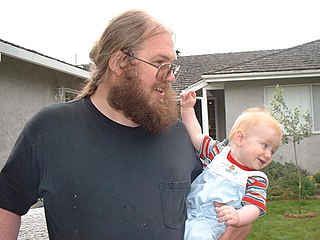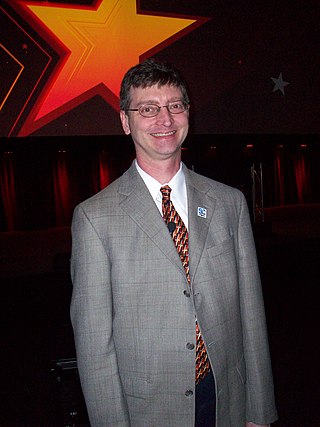Related Research Articles
Michael Thomas Heath is a retired computer scientist who specializes in scientific computing. He is the director of the Center for the Simulation of Advanced Rockets, a Department of Energy-sponsored computing center at the University of Illinois at Urbana–Champaign, and the former Fulton Watson Copp Professor of Computer Science at UIUC. Heath was inducted as member of the European Academy of Sciences in 2002, a Fellow of the Association for Computing Machinery in 2000, and a Fellow of the Society for Industrial and Applied Mathematics in 2010. He also received the 2009 Taylor L. Booth Education Award from IEEE. He became an emeritus professor in 2012.

David A. Forsyth is a South-African-born American computer scientist and the Fulton Watson Copp Chair in Computer Science the University of Illinois at Urbana–Champaign.
Wen-mei Hwu is the Walter J. Sanders III-AMD Endowed Chair professor in Electrical and Computer Engineering in the Coordinated Science Laboratory at the University of Illinois at Urbana-Champaign. His research is on compiler design, computer architecture, computer microarchitecture, and parallel processing. He is a principal investigator for the petascale Blue Waters supercomputer, is co-director of the Universal Parallel Computing Research Center (UPCRC), and is principal investigator for the first NVIDIA CUDA Center of Excellence at UIUC. At the Illinois Coordinated Science Lab, Hwu leads the IMPACT Research Group and is director of the OpenIMPACT project – which has delivered new compiler and computer architecture technologies to the computer industry since 1987. From 1997 to 1999, Hwu served as the chairman of the Computer Engineering Program at Illinois. Since 2009, Hwu has served as chief technology officer at MulticoreWare Inc., leading the development of compiler tools for heterogeneous platforms. The OpenCL compilers developed by his team at MulticoreWare are based on the LLVM framework and have been deployed by leading semiconductor companies. In 2020, Hwu retired after serving 33 years in University of Illinois at Urbana-Champaign. Currently, Hwu is a Senior Distinguished Research Scientist at Nvidia Research and Emeritus Professor at University of Illinois at Urbana-Champaign.
Chung Laung Liu, also known as David Liu or C. L. Liu, was a Taiwanese computer scientist. Born in Guangzhou, he spent his childhood in Macau. He received his B.Sc. degree in Taiwan, master's degree and doctorate in the United States.
Thomas Martin Conte is the Associate Dean for Research and Professor of Computer Science at Georgia Institute of Technology College of Computing; and, since 2011, also Professor of Electrical and Computer Engineering at Georgia Institute of Technology College of Engineering. He is a fellow of Institute of Electrical and Electronics Engineers (IEEE). He served as the president of the IEEE Computer Society in 2015.
Gul Agha is a professor of computer science at the University of Illinois at Urbana-Champaign, and director of the Open Systems Laboratory. He is known for his work on the actor model of concurrent computation, and was also Editor-in-Chief of ACM Computing Surveys from 1999 to 2007. Agha was born and completed his early schooling in Sindh, Pakistan. Agha completed his B.S. with honors at the California Institute of Technology in the year 1977. He received his Ph.D. in Computer and Communication Science from the University of Michigan in 1986 under the supervision of John Holland. However, much of his doctoral research was carried out in Carl Hewitt's Message-Passing Semantics Group at Massachusetts Institute of Technology (MIT). Agha's dissertation was published by the MIT Press as Actors: a model of concurrent computation in distributed systems, a book which, according to the ACM Guide to Computing Literature, has been cited over 3000 times.
Sarita Vikram Adve is the Richard T. Cheng Professor of Computer Science at the University of Illinois at Urbana-Champaign. Her research interests are in computer architecture and systems, parallel computing, and power and reliability-aware systems.

William Douglas Gropp is the director of the National Center for Supercomputing Applications (NCSA) and the Thomas M. Siebel Chair in the Department of Computer Science at the University of Illinois at Urbana–Champaign. He is also the founding Director of the Parallel Computing Institute. Gropp helped to create the Message Passing Interface, also known as MPI, and the Portable, Extensible Toolkit for Scientific Computation, also known as PETSc.
Marc Snir is an Israeli-American computer scientist. He holds a Michael Faiman and Saburo Muroga Professorship in the Department of Computer Science at the University of Illinois at Urbana-Champaign. He currently pursues research in parallel computing. He was the principal investigator (PI) for the software of the petascale Blue Waters system and co-director of the Intel and Microsoft-funded Universal Parallel Computing Research Center (UPCRC).
The Ken Kennedy Award, established in 2009 by the Association for Computing Machinery and the IEEE Computer Society in memory of Ken Kennedy, is awarded annually and recognizes substantial contributions to programmability and productivity in computing and substantial community service or mentoring contributions. The award includes a $5,000 honorarium and the award recipient will be announced at the ACM - IEEE Supercomputing Conference.

Oyekunle Ayinde "Kunle" Olukotun is a British-born Nigerian computer scientist who is the Cadence Design Systems Professor of the Stanford School of Engineering, Professor of Electrical Engineering and Computer Science at Stanford University and the director of the Stanford Pervasive Parallelism Lab. Olukotun is known as the “father of the multi-core processor”, and the leader of the Stanford Hydra Chip Multiprocessor research project. Olukotun's achievements include designing the first general-purpose multi-core CPU, innovating single-chip multiprocessor and multi-threaded processor design, and pioneering multicore CPUs and GPUs, transactional memory technology and domain-specific languages programming models. Olukotun's research interests include computer architecture, parallel programming environments and scalable parallel systems, domain specific languages and high-level compilers.

Tachyon is a parallel/multiprocessor ray tracing software. It is a parallel ray tracing library for use on distributed memory parallel computers, shared memory computers, and clusters of workstations. Tachyon implements rendering features such as ambient occlusion lighting, depth-of-field focal blur, shadows, reflections, and others. It was originally developed for the Intel iPSC/860 by John Stone for his M.S. thesis at University of Missouri-Rolla. Tachyon subsequently became a more functional and complete ray tracing engine, and it is now incorporated into a number of other open source software packages such as VMD, and SageMath. Tachyon is released under a permissive license.
Nancy Marie Amato is an American computer scientist noted for her research on the algorithmic foundations of motion planning, computational biology, computational geometry and parallel computing. Amato is the Abel Bliss Professor of Engineering and Head of the Department of Computer Science at the University of Illinois at Urbana-Champaign. Amato is noted for her leadership in broadening participation in computing, and is currently a member of the steering committee of CRA-WP, of which she has been a member of the board since 2000.

Rob A. Rutenbar is an American academic noted for contributions to software tools that automate analog integrated circuit design, and custom hardware platforms for high-performance automatic speech recognition. He is Senior Vice Chancellor for Research at the University of Pittsburgh, where he leads the university's strategic and operational vision for research and innovation.
Lawrence Rauchwerger is an American computer scientist noted for his research in parallel computing, compilers, and computer architecture. He is a speaker in the ACM Distinguished Speakers Program and the deputy director of the Institute of Applied Mathematics and Computational Sciences at Texas A&M University. He is the co-director of the Parasol Lab and manages the lab's software and systems group.

Keshav K Pingali is an American computer scientist, currently the W.A."Tex" Moncrief Chair of Grid and Distributed Computing at the University of Texas at Austin, and also a published author. He previously also held the India Chair of Computer Science at Cornell University and also the N. Rama Rao Professorship at Indian Institute of Technology. He is a Fellow of the American Association for the Advancement of Science, Association for Computing Machinery and Institute of Electrical and Electronics Engineers. In 2020, he was elected a Foreign Member of the Academia Europeana.
Professor David Abramson FIEEE FACM FTSE FACS is an Australian computer scientist. He has been Director of the Research Computing Centre at the University of Queensland, Australia, since 2012. He has been involved in computer architecture and high performance computing research since 1979.
Roy H. Campbell is a computer scientist and the Sohaib and Sara Abbasi Professor emeritus at University of Illinois at Urbana–Champaign and director of the Assured Cloud Computing University Center of Excellence. Campbell is best known for his work in operating systems, parallel computing, and multimedia on the internet.

Torsten Hoefler is a Professor of Computer Science at ETH Zurich and the Chief Architect for Machine Learning at the Swiss National Supercomputing Centre. Previously, he led the Advanced Application and User Support team at the Blue Waters Directorate of the National Center for Supercomputing Applications, and held an adjunct professor position at the Computer Science Department at the University of Illinois at Urbana Champaign. His expertise lies in large-scale parallel computing and high-performance computing systems. He focuses on applications in large-scale artificial intelligence as well as climate sciences.
The Center for Supercomputing Research and Development (CSRD) at the University of Illinois (UIUC) was a research center funded from 1984 to 1993. It built the shared memory Cedar computer system, which included four hardware multiprocessor clusters, as well as parallel system and applications software. It was distinguished from the four earlier UIUC Illiac systems by starting with commercial shared memory subsystems that were based on an earlier paper published by the CSRD founders. Thus CSRD was able to avoid many of the hardware design issues that slowed the Illiac series work. Over its 9 years of major funding, plus follow-on work by many of its participants, CSRD pioneered many of the shared memory architectural and software technologies upon which all 21st century computation is based.
References
- ↑ UIUC Computer Science Department's Online Historical Timeline Archived 2008-05-12 at the Wayback Machine
- ↑ Kuck is a B.S. graduate of the University of Michigan. "(press release) : ACM - IEEE Computer Society Award Honors Intel's Kuck for Innovations in High-Performance Computing". Archived from the original on 2010-12-05. Retrieved Oct 2, 2010.
The second annual ACM-IEEE Computer Society Ken Kennedy Award will go to Intel Fellow David Kuck for advances to compiler technology and parallel computing that have improved the cost-effectiveness of multiprocessor computing.
- ↑ "Citation - David J Kuck (awarded) the 2010 ACM / IEEE Computer Society Ken Kennedy Award". Archived from the original on May 4, 2012. Retrieved Oct 2, 2010.
For his pioneering contributions to compiler technology and parallel computing, the impact of his research on industry, and the widespread influence of his teaching and mentoring.